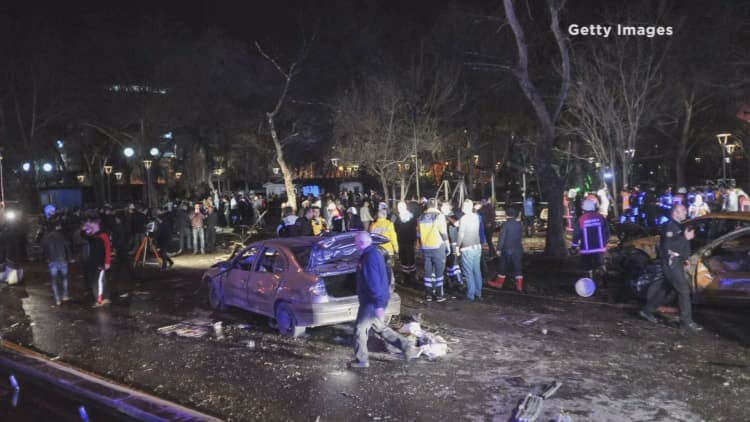Kurdish militants on Thursday claimed a suicide bombing in Ankara that killed 37 people this week and warned of further attacks, while Germany shut down its diplomatic missions and schools in Turkey.
The Kurdistan Freedom Hawks (TAK), linked to militants who have waged a three-decade insurgency against Turkey, said they carried out Sunday's bombing and vowed further strikes to avenge military operations in the largely Kurdish southeast.
Berlin closed its embassy in Ankara, consulate in Istanbul and German schools in both cities, citing "concrete and very serious" indications of terror attacks being prepared against its properties. It was not clear if the threat to German interests also came from Kurdish militants.
"We have hundreds of members ready to conduct suicide attacks," TAK said in a statement on its website, describing Sunday's bombing as revenge for military operations in the southeast, where hundreds of people including civilians, soldiers, police and militants have been killed since July.
It is the second suicide bombing in a month in the heart of Ankara claimed by TAK, opening a dangerous new phase in Turkey's war with Kurdish militants as deadly attacks spread to its biggest cities well beyond the southeast.

The government sees the rising violence as directly linked to the war in neighboring Syria, where three Kurdish-controlled regions voted to approve the establishment of a federal system in the north on Thursday.
Ankara fears Kurdish ambitions in Syria are fueling separatism at home. It says Kurdish militants in Turkey have deep ideological and logistical ties with Kurdish groups in Syria and have brought weapons and fighters across the border.
That has complicated international efforts to end the war in Syria and raised tensions with Washington, which has backed Syrian Kurdish militia fighters against Islamic State.
TAK said it had been targeting the security forces in Ankara and had not intended to kill members of the public. But it said civilian deaths were "inevitable" in its attacks.
Security officials have said the two perpetrators of the Ankara bombing, a man and a woman, were linked to the outlawed Kurdistan Workers Party (PKK), which launched an armed uprising in southeastern Turkey in 1984 to press for Kurdish autonomy.
TAK, which also claimed a February car bombing in Ankara that killed 29 people, says it split from the PKK but experts who study Kurdish militants say they retain close links.
A senior PKK commander described the previous Ankara attack as payback, saying Turkey could see "thousands" of such bombings for its policies towards Kurds.
"Concrete Leads"
German Foreign Minister Frank-Walter Steinmeier gave few details about the closure of diplomatic missions in Turkey.
"Yesterday evening, our security authorities received several concrete and very serious leads that terror attacks against our German representations in Turkey were being prepared," he told reporters in Berlin.
The Istanbul governor's office dismissed the German warning, saying people should not pay attention to "sensational and unserious news and rumors" of questionable aims.
"Some foreign country representations in our country have tried to implement measures and take decisions that could influence the public negatively based on 'unconfirmed rumors' without consulting official bodies," it said.
In the wake of the bombings, President Tayyip Erdogan has called on parliament to widen anti-terrorism laws that rights groups say are already too broad. They have been used in recent months to detain academics and journalists.
He also wants the immunity from prosecution lifted for deputies from the pro-Kurdish opposition HDP, parliament's third-largest party, accusing it of militant links.
Prime Minister Ahmet Davutoglu proposed on Thursday that parliament should lift immunity for all lawmakers facing criminal investigations.



